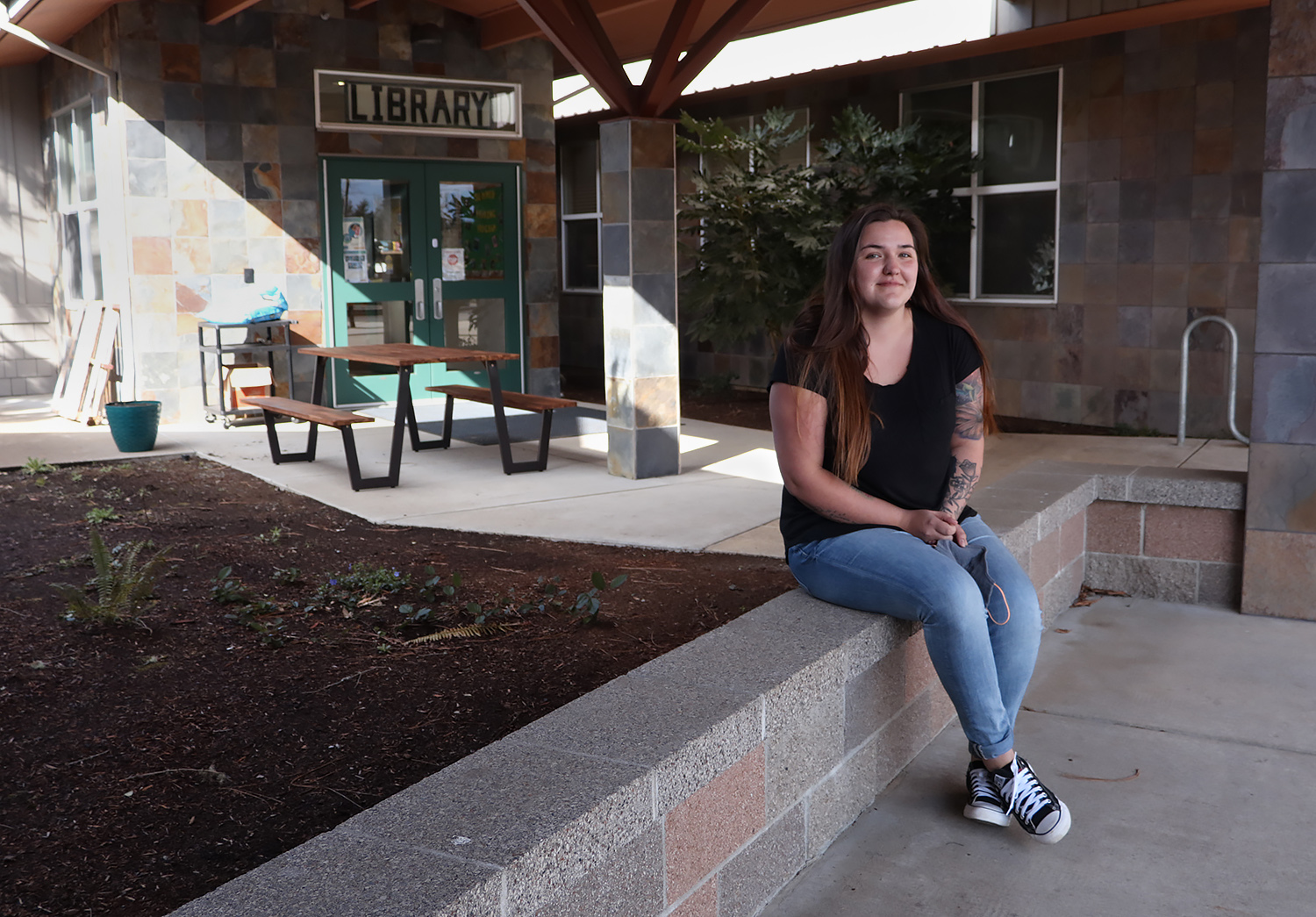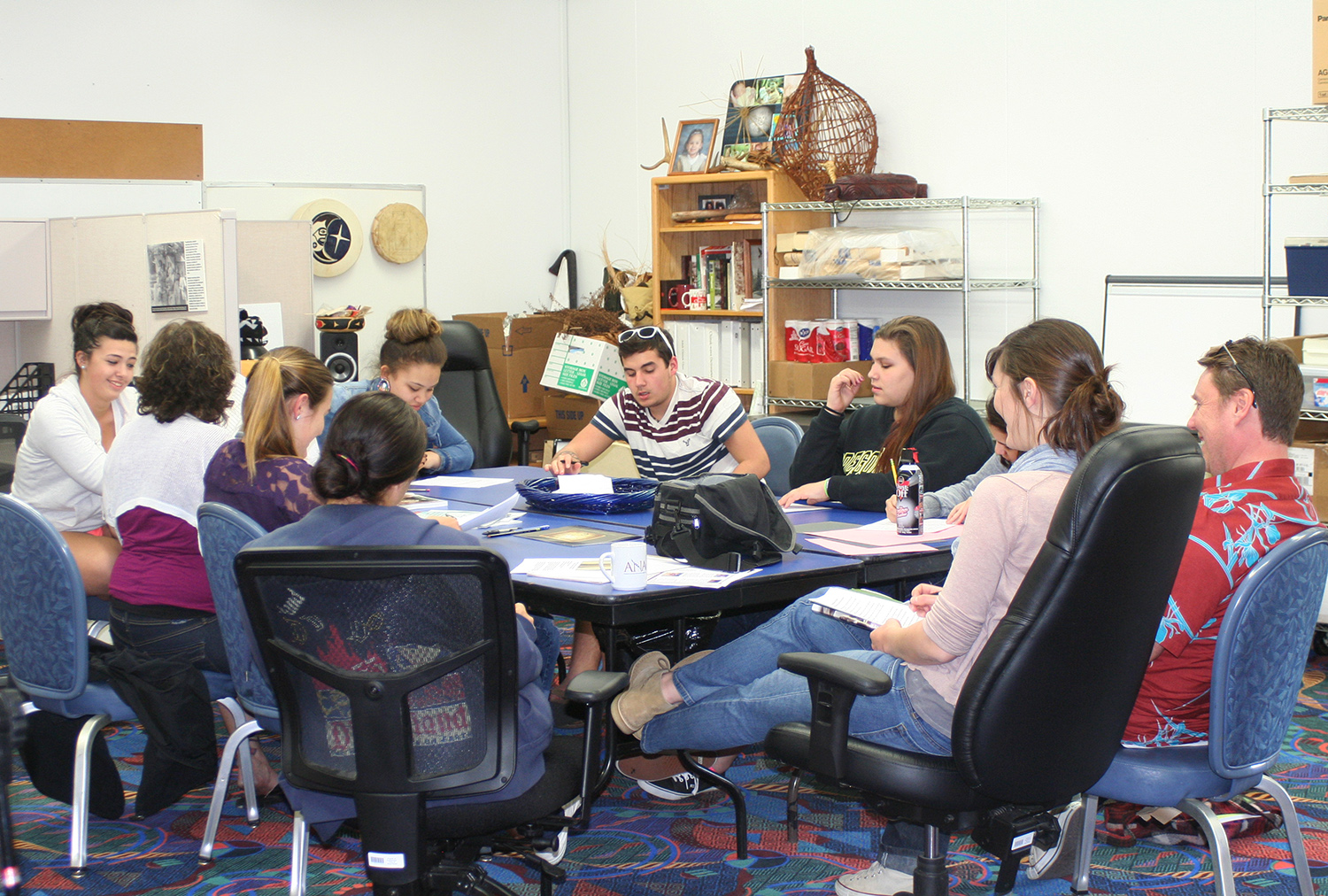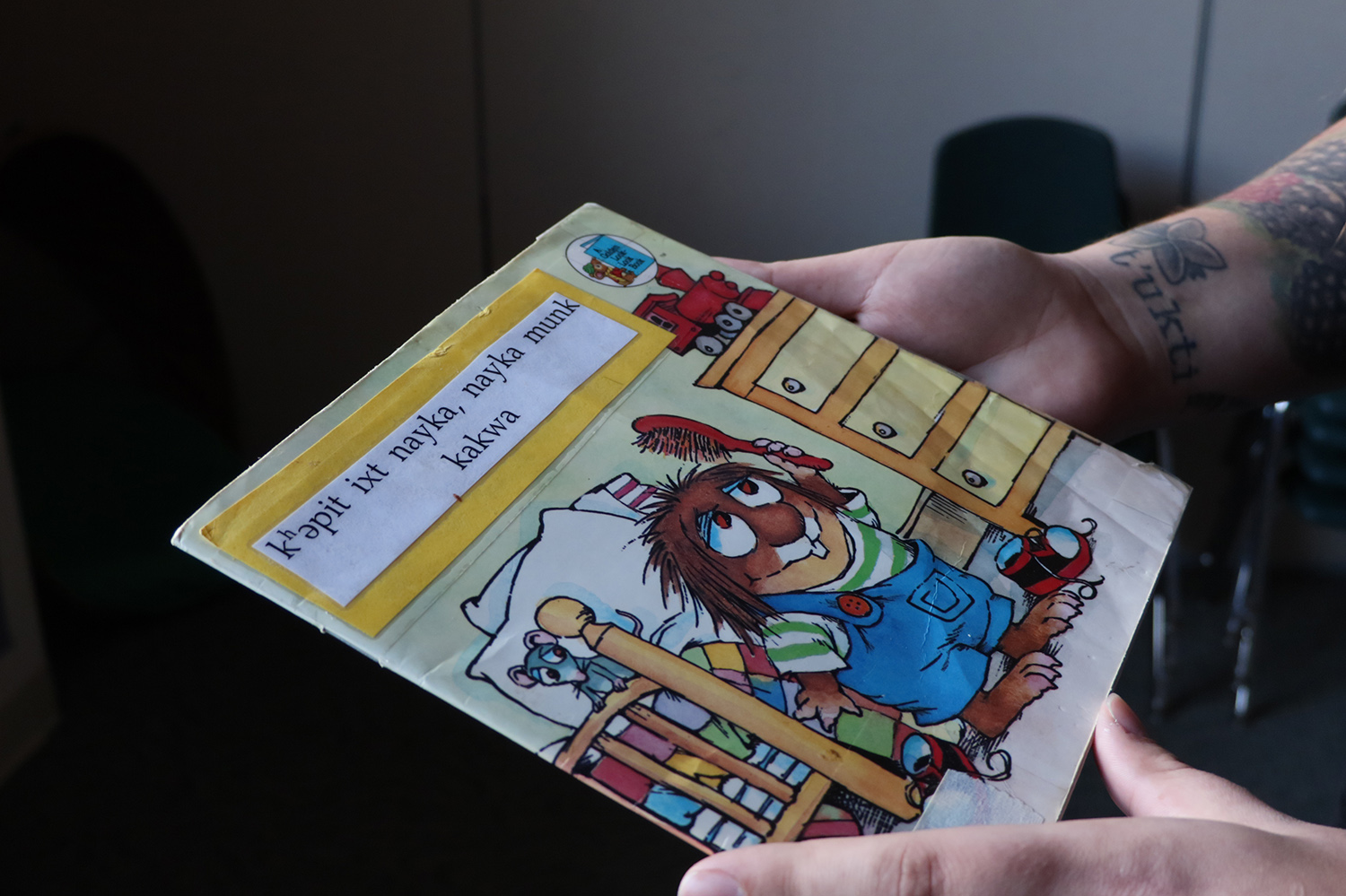NextGenRadio
Native American Journalists Association Newsroom
Finding, coaching and training public media’s next generation.
“In the Time of COVID-19”
Traditionally, the role as a tribal elder was to pass down the language through oral stories, but after years of assimilation, that role is now on the shoulders of the young language department staff. Zoey Holsclaw is a Grand Ronde language teacher and outreach coordinator struggling to teach and encourage participation in the Chinuk Wawa language in the midst of the pandemic.
Illustration by Ard Su
How a Grand Ronde woman is revitalizing her Native language during a pandemic
As a young Grand Ronde tribal member, Zoey Holsclaw learned storytelling happens from the first frost until the frogs sing.
Wintertime was when activity would slow and the elders of the Confederated Tribes of Grand Ronde could share their stories and history in Chinuk Wawa, their Native language.
“I love speaking the language, and part of why I want to teach people to speak in Chinuk Wawa is because we don’t have that many speakers right now,” Holsclaw said. “If we lose all of our speakers and we lose our language, and that’s a huge part of our culture that we won’t be able to get back.”
Listen to this story

Zoey Holsclaw, 25, a post-elementary Chinuk Wawa teacher and Grand Ronde language department outreach coordinator, sits outside her office building on the Confederated Tribes of Grand Ronde reservation in Oregon on March 12, 2021. (Photo by Kamiah Koch)
Today after centuries of colonization, the number of fluent speakers has dwindled to an estimated double-digit number.
Holsclaw is one of the seven Chinuk Wawa teachers in the Grand Ronde language department. She is also the department’s outreach coordinator, which means she is responsible for finding ways to interest more people in learning the language.
She began learning Chinuk Wawa as a child. While she was learning to say “hello” and “goodbye” in preschool classes, her older sister, Ali Holsclaw, began to take the adult classes.

Zoey Holsclaw sits in her Chinuk Wawa class in the Chuchalu’s cultural education room in 2013. (Photo courtesy of Zoey Holsclaw)

A book from the Grand Ronde language program classroom, All By Myself, translated to Chinuk Wawa for early-language learners. (Photo by Kamiah Koch)
The sisters continued to learn the language, becoming two of the few fluent speakers. That eventually led them to teaching.
But unlike her sister, Holsclaw started her position in the middle of the COVID-19 pandemic, when all classes shifted to an online format.
On her first day, she said, she was one of the only ones working in the building after someone in her department tested positive for COVID-19 and her new co-workers were quarantining at home.
“At first, I was really nervous about teaching virtually and probably the first couple of months I hated it because none of the kids want to turn their cameras on and they don’t want to participate,” Holsclaw said. “But now that I’m getting into a swing of things, I kind of like it. But we’re also going to in-person teaching next week, so things are being thrown up in the air again.”
Throughout the pandemic, Holsclaw intermittently worked from home. COVID-19 is not something she is happy about, but working remotely gave her time to be at home with her 1-year-old daughter and see her achieve baby milestones.
Her daughter even participated in teaching classes from home one day, mimicking her mom by holding up Chinuk Wawa vocabulary flashcards to the virtual class.
But teaching remotely takes even longer, and Holsclaw says she still feels pressure to keep their language alive.
“It takes three weeks to get through one lesson so that every kid is on the same page,” Holsclaw said. “I could just move on, but I don’t. The goal is to create speakers, and so I don’t want to leave kids behind when they don’t show up because that just seems like the opposite of what I want to do.”
In her office, she has a cabinet full of books and binders of Native languages no one speaks anymore. She attributes the loss of those languages to the forceful relocations of tribes to reservations and assimilation practices that continued to the twentieth century.

A translation of the word ‘poof’ and its variations from a binder about a no-longer spoken Kalapuyan language. This binder is one of many in Holsclaw’s office. (Photo by Kamiah Koch)
One such practice was the federal removal of Grand Ronde’s tribal sovereignty in 1954 in what was also known as the termination era.
“Our area was affected by assimilation, and termination had a huge effect on the people here, especially when it comes to learning their culture and having pride in who they are,” Holsclaw said. “There is still pride there. It’s just when you grow up in an area where you can’t really show that, it kind of is suppressed and kind of hard to get involved when you’ve gone your whole life being told that you can’t be Native.”
Termination meant the tribe no longer had recognition from the United States government, losing what was promised in signed treaties and federal aid.
However, in 1983, a group of Grand Ronde members raised enough money to go to Washington, D.C., to appeal to Congress. They won, regaining recognition. But 30 years of damage was already done.
“There’s a lot of cultural shame and trauma that has kind of happened to our people, and that kind of sits with a lot of our elders. And so there’s shame in wanting to learn the language, because people feel like they should already know it, but they don’t.” Holsclaw said. “But since the pandemic, there have been quite a few others that have expressed interest in learning, so that’s something that I’m wanting to explore more as the outreach coordinator.”
On March 6, the U.S. Senate approved the largest investment in Native programs, with $31 billion going to Native communities, including $20 million to mitigate the effect of the coronavirus on Native languages as part of the COVID-19 American Rescue Plan.
About NextGenRadio
The Next Generation Radio Project is a week-long digital journalism training project designed to give competitively selected participants, who are interested in radio and journalism, the skills and opportunity to report and produce their own multimedia story. Those chosen for the project are paired with a professional journalist who serves as their mentor.
This edition of the #NPRNextGenRadio project was produced in collaboration with the Native American Journalists Association in March 2021.
Acknowledgments
Managing Editors:
Jourdan Bennett-Begaye - Managing Editor, Indian Country Today, Washington, D.C.
Phyllis Fletcher - Senior Editor, American Public Media Studios, Seattle
Audio Engineer lead:
Selena Seay-Reynolds - Freelance audio engineer, Los Angeles/New Jersey, with Patrice Mondragon - Audio Tech, Colorado Public Radio
Visuals team lead:
Erica Lee - Freelance photojournalist, New Jersey, with Kevin Beaty of The Denverite and Colorado Public Radio, Denver
Illustration team lead:
Emily Whang - Freelance Illustrator, Los Angeles with Ard Su - Freelance Illustrator, Baltimore, and Lauren Ibañez - Freelance Illustrator, Houston
Digital Editors:
Manuelita Beck, Politics Now Editor, USA TODAY, Indianapolis
Alexis L. Richardson, Chief Innovation Officer & Digital Strategist, “The Mom Edit,” Philadelphia.
Web Developers/Producers:
Cameo Hill of NPR station KJZZ in Phoenix
Robert Boos of Metropolitan State in Saint Paul, Minnesota.
Our journalist/mentors for this project were:
Brian Bull - Reporter, KLCC, Eugene, OR
Carrie Jung - Education Reporter, WBUR, Boston
Graham Lee Brewer - Associate Editor for Indigenous Affairs, High Country News, Norman, OK
Savannah Maher - Rocky Mountain News Bureau, Indigenous Affairs Desk, KUNM, Albuquerque, NM
Christine Trudeau - High Country News, Contributing Editor to the Indigenous Affairs Desk, San Diego
NPR’s Next Generation Radio program is directed by its founder, Doug Mitchell.
